The AMD 3rd Gen Ryzen Deep Dive Review: 3700X and 3900X Raising The Bar
by Andrei Frumusanu & Gavin Bonshor on July 7, 2019 9:00 AM EST** = Old results marked were performed with the original BIOS & boost behaviour as published on 7/7.
Gaming: F1 2018
Aside from keeping up-to-date on the Formula One world, F1 2017 added HDR support, which F1 2018 has maintained; otherwise, we should see any newer versions of Codemasters' EGO engine find its way into F1. Graphically demanding in its own right, F1 2018 keeps a useful racing-type graphics workload in our benchmarks.
Aside from keeping up-to-date on the Formula One world, F1 2017 added HDR support, which F1 2018 has maintained. We use the in-game benchmark, set to run on the Montreal track in the wet, driving as Lewis Hamilton from last place on the grid. Data is taken over a one-lap race.
| AnandTech CPU Gaming 2019 Game List | ||||||||
| Game | Genre | Release Date | API | IGP | Low | Med | High | |
| F1 2018 | Racing | Aug 2018 |
DX11 | 720p Low |
1080p Med |
4K High |
4K Ultra |
|
All of our benchmark results can also be found in our benchmark engine, Bench.
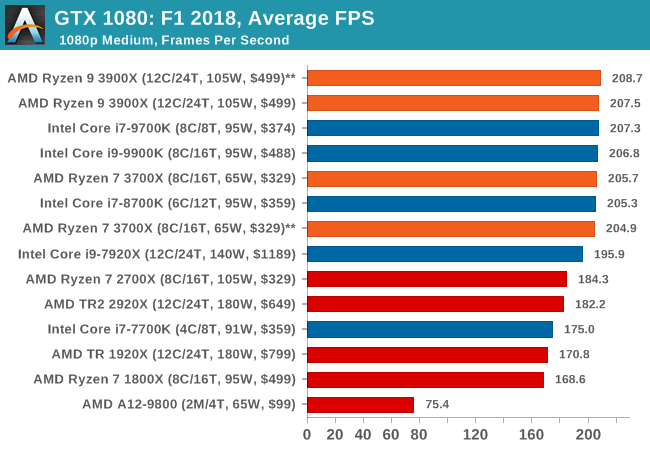
| F1 2018 | IGP | Low | Medium | High |
| Average FPS | 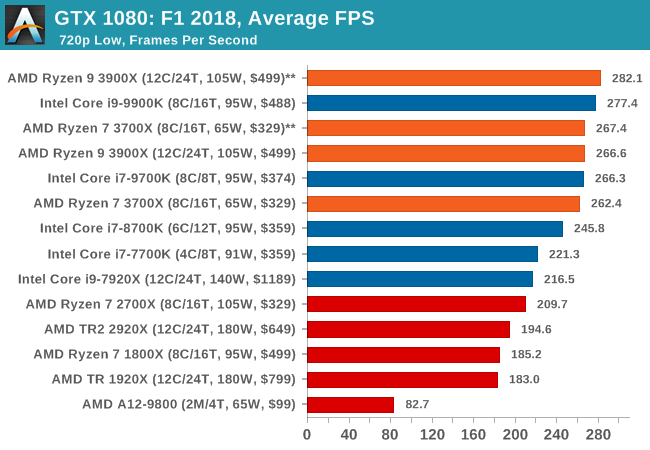 |
 |
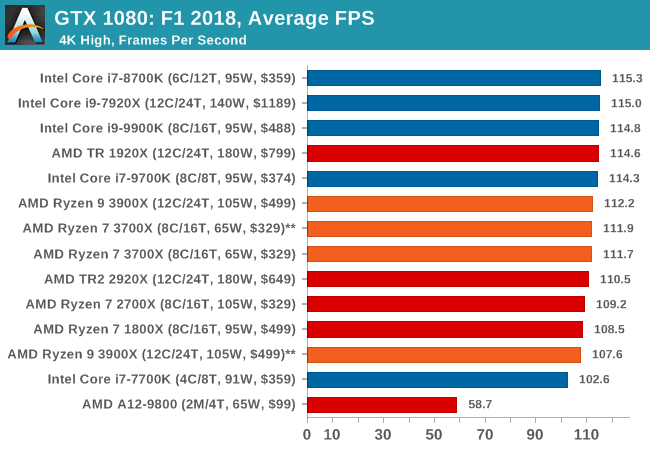 |
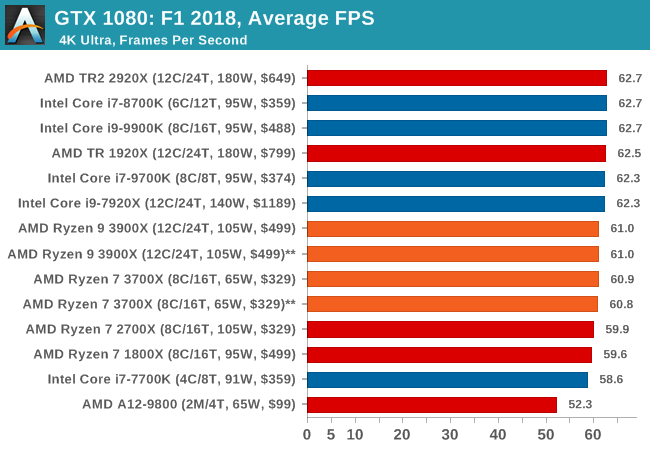 |
| 95th Percentile | 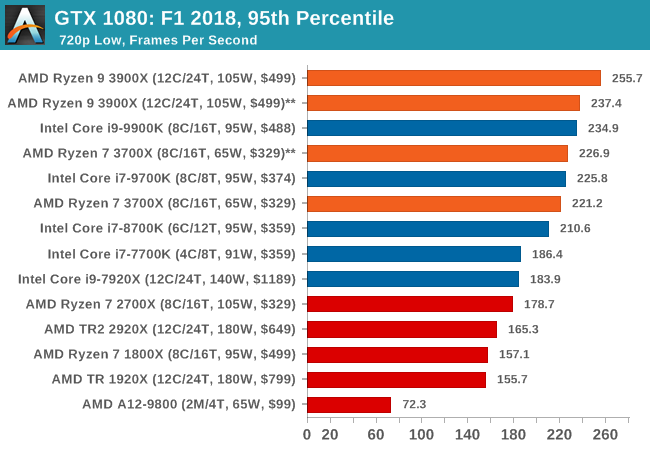 |
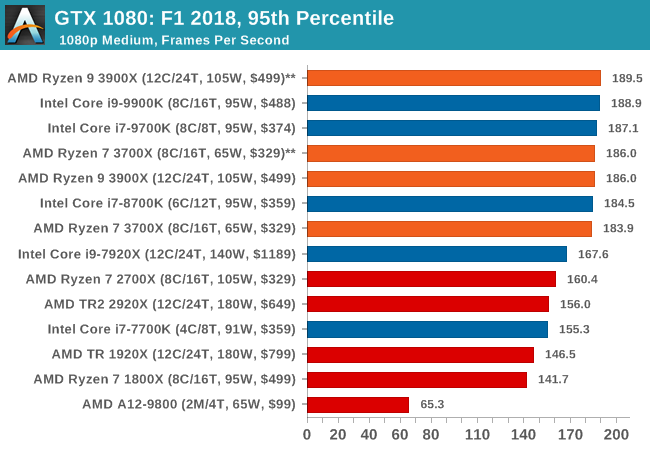 |
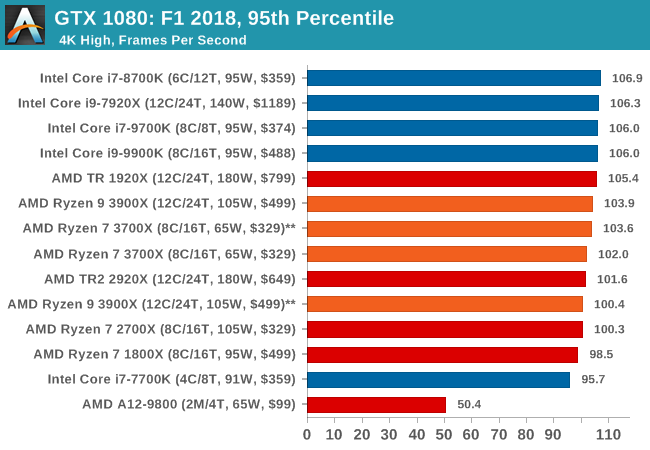 |
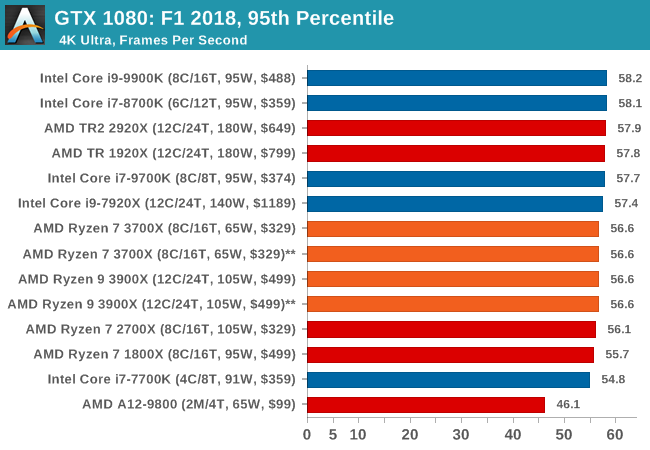 |


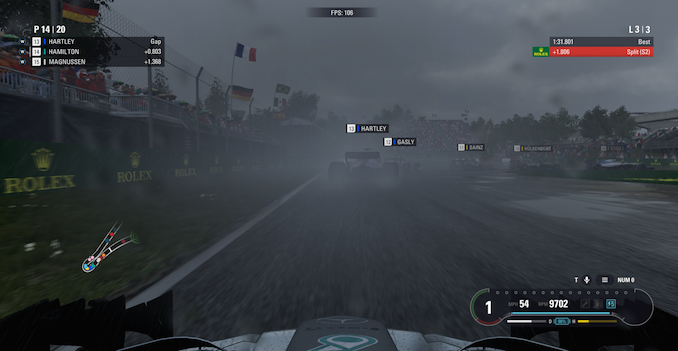








447 Comments
View All Comments
Irata - Monday, July 8, 2019 - link
Thanks for your reply Ryan. I did not intend to be rude when saying "lazy" but rather show that I do not think this is something that was done by intent.Like I said - mention these things and it helps clear up misunderstandings.
It is definitely very positive that you test the Ryzen CPU with the latest builds though.
I also like that you mention if prices include an HSF or not, but it would have been nice to mention the price of HSF used for Intel systems (when not boxed), as e.g. the Thermalright True Copper is a rather expensive CPU cooler.
I think you already addressed not using a faster nVME drive (a PCIe 4 version would have been ideal if available - this would also have given an indication of potentially increased system power use for the Ryzen with PCIe 4 drives) on Twitter.
Those are little nitpicks, so not intended to be a criticism of the overall article. It is just that people tend to be rather sensitive when it comes to Intel vs. AMD CPU comparisons, given Intel's history of things they are willing to do to keep mind- and marketshare.
Daeros - Monday, July 15, 2019 - link
Whether or not it is intentional, AT has had an increasing Intel bias over the last several years. Watch to see how long it takes for an AMD article to get pushed down by rumors or vaporware from Intel or Nvidia.rarson - Monday, July 8, 2019 - link
I think Ryan brings up several salient points, and whether or not you think that they did or did not have the time to do what you wanted (they were also a man down without Dr. Cuttress), the fact of the matter is that AMD dropped a bunch of CPUs and GPUs all at once and literally everyone was scrambling to do what they could in order to cover these launches.I don't think it's coincidence that even in the tech Youtube space, if you watch 10 different reviews you'll largely see 10 different testing methodologies and 10 (somewhat) different results. Every single reviewer I've talked to said that this was one of, if not the most, difficult launch windows they've ever dealt with. Additionally, launching on a weekend with all of its associated complications (not just on reviewers' ends, but partners as well) is a bitch, with everyone scrambling at the last minute on their days off getting in last-minute updates and whatnot.
When AMD tells you at the last minute, "Oh, the brand new Windows 10 update includes something new" you don't necessarily have time to go back and redo all the benchmarks you had already done on the Intel platform.
TL;DR while there may have been flaws in some of the testing, take the details with a grain of salt and compare them to the myriad of other reviews out there for a better overall picture if necessary.
Irata - Tuesday, July 9, 2019 - link
You are making a good point and unfortunately this was an - unfortunately - typical AMD CPU launch with things still being beta. I would assume testers are none too happy about having to re-do their tests.What I don't get from AMD (even if (and that's a capital IF) it's not their fault, it's their responsibility) is how they cannot see how this makes their products appear in a less favorable light. Let's say the buggy bios cost them 5%, the conclusion with a 5% better performance would have been even more in Ryzen 3000's favor.
It's a bit like showing up to a job interview wearing the clothes you wore for the previous day's physical activity.
Daeros - Monday, July 15, 2019 - link
Lazy isn't in it. Intentionally misleading is more like it. On one page, where AMD wins more than it looses in the charts, out of 21 paragraphs, 2 had something positive to say about AMD or Ryzen 3k without following up with something along the lines of "but we know Intel's got new tech coming, too"Ryan Smith - Monday, July 8, 2019 - link
To be sure, they're still valid. The patches for Fallout and ZombieLoad are not out yet (I only mention them because the vulnerabilities have already been announced).RSAUser - Monday, July 8, 2019 - link
They've been out since 14 May, what are you talking about?djayjp - Monday, July 8, 2019 - link
Don't forget RIDLMeteor2 - Sunday, July 14, 2019 - link
RIDL and Zombieload are the same thing.Yes, the Intel CPUs should have been re-benchmarked on 1903, updated after 14 May when the OS-side fixes for the new MDS-class flaws were released. That's only fair and it's quite reasonable to expect that users will apply security updates, not leave their systems unpatched and vulnerable for perhaps a percent or two of performance.
FireSnake - Monday, July 8, 2019 - link
Ryan: how is this not explained in the article? I am reading this site for more then a decade and I trust you most. and I trust you will provide such information. I would expect, you update the article with this info.